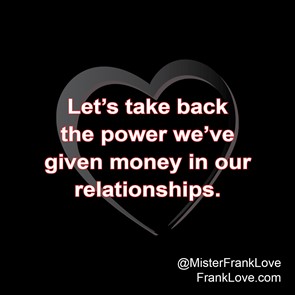 I regularly hear statistics about how the top issue couples fight over is money. This happens when we have different ideas around money topics than our partners. How much do we need to earn? How much should we spend? What should we spend on? How much should be saved? It can be a lot to discuss. Conscious or not, we all bring financial expectations and lifestyle desires to our relationships. Whenever I have unmet relational or financial expectations, I recall my experience travelling to Ghana over twenty years ago.
I regularly hear statistics about how the top issue couples fight over is money. This happens when we have different ideas around money topics than our partners. How much do we need to earn? How much should we spend? What should we spend on? How much should be saved? It can be a lot to discuss. Conscious or not, we all bring financial expectations and lifestyle desires to our relationships. Whenever I have unmet relational or financial expectations, I recall my experience travelling to Ghana over twenty years ago.
I wanted to travel to Ghana to feel and experience my ancestral culture. It was a trip I was excited to take. It had been fifteen years since my first trip there, and I felt this was a sort of a pilgrimage. As Muslims are honored to make the pilgrimage to Mecca, I was honored to visit Ghana.
The trip was arranged by my aunt who had moved to Ghana from New York City. She had married a Ghanaian and had become entrenched in the culture there. One of her entrepreneurial ventures was being a guide for Americans who visited. There was no website or itinerary to review, no written contract. There was my faith in myself and my faith in my aunt. I was uninterested in the details and had great confidence in her, so she planned my trip.
I arrived and was taken to a hotel. The location was in a place that could not be considered a tourist area. My aunt checked me into the accommodations . . . and there I was. I expected a Hilton (or comparable establishment); what I got was a room in a no-name motel with a double bed, the aromatic fragrance of bug spray, and no hot water. What the hell did I get myself into? Is this what [a certain amount of money] gets me? This is going to be a miserable trip.
But I decided to roll with it and to have a good attitude.
The next day my experience outside of the hotel began. My interaction with real people ensued. My aunt took me to meet Auntie Yaa and her family. Auntie Yaa was a Ghanaian woman and longtime friend of my aunt. I got the impression that everyone who came to Ghana on one of her trips met Auntie Yaa. In fact, my mother had done so on a previous trip.
Auntie Yaa lived about a block away from the hotel. Her home was a compound that she shared with her family. She was a widow. The patriarch of the family, her eldest son, Eric, was now in the States at college; so his younger brother, Ransford, was the man of the house.
They welcomed me with open arms. I fraternized with Ransford, who later came to visit me in Washington, DC. I enjoyed Auntie Yaa’s great cooking on that day and on many other days during my stay. One of the traditions in Ghanaian culture is to feed those who visit unannounced. Several evenings I returned to their home and was nourished by one of Auntie her meals. These weren’t leftovers either! She made the meal from scratch—I know this because I watched her. My good attitude netted me good food and interactions with good people.
One of the cultural components I most wanted to experience on this trip was buying African clothes. I wanted to come home with a healthy assortment of batakaris, fugus, and political suits (batakaris and fugus are African tops). With this goal in mind, I spent a lot of my trip shopping.
Upon arrival at the Arts Centre marketplace, I quickly became irritated with the bartering culture as I made my way through negotiations with a few entrepreneurs. But it didn’t take long for me to realize a few things:
-
Many of the vendors had the same items. If I walked through the market one full time without negotiating with anyone, I could get a feel for the variance in items and pricing. Otherwise, I found myself negotiating and buying items with the first seller I met, only to discover that the same item was cheaper next door.
-
If possible, I may be well-served to go to the market with a Ghanaian. At some point, I was privileged to go to the market with Lai, my aunt’s Ghanaian husband. He was able to cut to the chase with much less haggling. I would simply ask him if something was reasonably priced. His answer was either “yes” or “no,” and I would make my purchase accordingly.
-
I was able to simplify my shopping experience by asking what a merchant’s best price was. After they shared, I told them, “I’ll be back after I walk through the market.” If they had the best price, I circled back and made the purchase.
I had a great time getting to know the culture. I was developing my own way of navigating the bartering process, and it was a lot of fun. In the midst of it all, I would happily return to my humble hotel room and sleep like a baby. I even came up with a cold-shower-strategy: I would quickly get wet, soap up, then quickly rinse. It was no 5- or 10-minute shower, but I was clean. I was becoming more and more comfortable with my accommodations and with my trip. My expectations were having less and less hold on my experience.
How does my experience in Ghana relate to our difficulties navigating finances in our relationships? In our American/capitalist society, we often frame our thinking around acquiring more stuff, getting nicer stuff, and having a high-quality experience. “Experience the finer things in life.” Rarely do we willingly scale back, buy less, spend less, or choose a humbler experience.
Technology has only heightened our expectations. We’re used to having access to more people, more information, and speedy results. “More, better, faster.”
These influences show up in our relationships, too. We have been trained to expect things exactly as we want them, when we want them. But this mindset doesn’t usually help when we differ with our partners.
What is the point here? We can slow down. We can lower our expectations and demand less. We can reject the prevalent fallacy that urges us to “get more money” and “experience the finer things in life.” We are sold that in an attempt to keep us in the rat race, constantly competing against ourselves and each other . . . even in our relationships.
 Slowing down may look like enjoying a walk to one place instead of driving to four places. It may look like staying in the house and cooking instead of eating out and going to the movies.
Slowing down may look like enjoying a walk to one place instead of driving to four places. It may look like staying in the house and cooking instead of eating out and going to the movies.
Lowering expectations may mean having the confidence that our bodies and minds can adjust to less than we thought we would (or should) have, if we give ourselves time and a smile.
The next time we are narrowly focused on acquiring more or having nicer things, let’s reflect on my Ghanaian story and be reminded that we can be happy with less than we expected. We can be happy simply because we are eating good food or enjoying the company of good people.
Let’s take back the power we have given to money. Let’s be aware of our programing and de-program ourselves for the sake of our relationships.
Keep Rising,
Frank Love
Watch Frank Love’s presentation “The Act of Caring.”
Subscribe to receive Frank’s weekly blog.
Become a sponsor of Frank Love and his work creating loving cultures in our relationships with a monthly contribution of as little as $2. Sign up today at Patreon.com/FrankLove.
–—–—–—–—–—–—–—–—–—–—–—–—–—–—–—–—––
Each week, Frank Love hosts Zoom support group meetings that assist women and men as we work to create a loving culture in our relationships. Calls occur from 7 p.m. to 8:30 p.m. EST and can be accessed by visiting FrankWeeklyCall.com.
- Tuesdays—Black Women: Creating a Loving Culture in Our Relationships
- Thursdays—Black Men: Creating a Loving Culture in Our Relationships
–—–—–—–—–—–—–—–—–—–—–—–—–—–—–—–—– –
Frank Love coaches individuals toward creating a loving culture in their family. He is also the author of Relationship Conversations You Don’t Want to Have (But Should Anyway) and 25 Ways to Be Loving. To schedule a free consultation, contact Frank at Frank@FrankLove.com.

